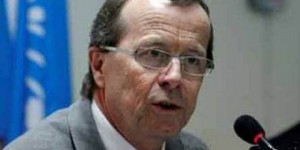By Libya Herald Reporters.

Tunis, 11 December 2015:
The House of Representatives and the General National Congress are in danger of breaking up, . . .[restrict]new UNSMIL chief Martin Kobler has told the UN Security Council.
Kobler explained to Security Council members “ I have no illusions about the difficult realities that confront us in Libya. The two institutions at the centre of the political conflict in Libya are beginning to show dangerous signs of internal fragmentation”.
He was speaking by video conference from Tunis, hours after he had concluded two days talks with members of the Libya Dialogue. These talks, he explained, he had called in the face of the continuing inability of both the HoR and GNC to endorse the Political Accord. They had ended with an agreement that the Political Accord would be signed next Wednesday, 16 December.
He described the participants in the political dialogue as “some 40 courageous men and women who take considerable risks to put the interest of Libya above personal interest”.
Kobler said that over and above desperately needed humanitarian assistance for some 2.4 million people in Libya, of whom 435,000 were internal refugees, the country was falling apart. Criminality and lawlessness in the south had reached “endemic levels” while extremist and terrorist groups were continuing to expand their spheres of influence. Meanwhile collapsing oil revenues meant the country was rapidly running out of money and in accelerating economic decline.
“In the face of all this, ” he said, “Libyans are overwhelmingly united on one key point. Libya can and should no longer wait for peace to come”.
Libya, he said, was in race against time.” Its very social fabric, national unity and territorial integrity is directly endangered by the forces of extremism and terrorism, the likes of Daesh, [IS] which are actively consolidating and seeking to extend their influence beyond areas under their immediate control”. Many dialogue participants, he added, had in the last two days expressed their fear of the imminent danger of Daesh expansion.
They had also said that the future Government of National Accord should be able to assume its responsibilities in Tripoli without threats and intimidation. This needed a collective agreement on security.
Kobler told the Security Council that he was thus taking the opportunity to “call directly on the leadership of the General National Congress to allow my colleagues and myself to land with our airplane in Tripoli and other cities in Libya to freely interact with whomever we deem necessary. We can only fulfil our mandate if we have free access to all security actors, particularly in Tripoli”.
Referring to the Rome Conference, Kobler said that the Security Council’s unequivocal support for the Political Accord would send “a clear message to all those whose narrow agendas continue to stand in the way of peace”.
He also urged that every effort should be made to guarantee that the technical support for the future Government of National Accord would be visible, tangible and sustainable. This would include dealing with the “terrible plight endured by the civilian population”.
He also said that he could not overstate the threat posed by Daesh. “Mobilising international support to assist Libyan authorities to take decisive measures to combat, contain and eliminate this imminent danger is a must”.
He finished by assuring all Libyans that the door would always remain open for those who wished to join on the road to peace.
“Once the agreement is signed, we will immediately assist in broadening the basis of support for the new Government which should ultimately be based in Tripoli. Through engagement with the militias, political parties, tribal elders, and civil society, we will advocate for the acceptance of the Libyan Political Agreement”. [/restrict]







